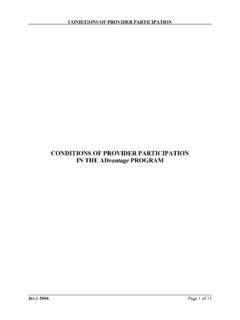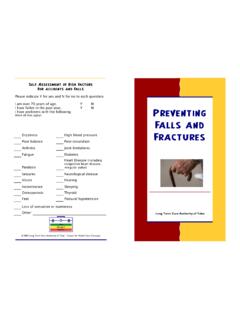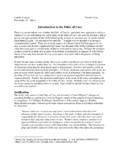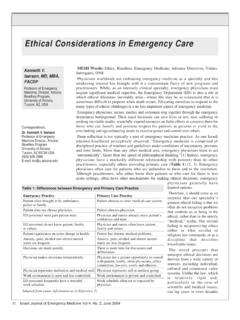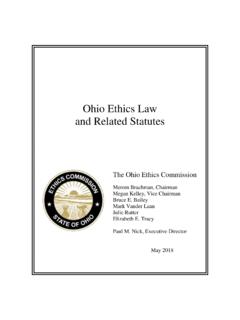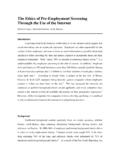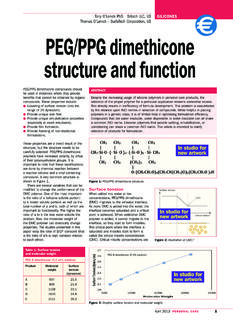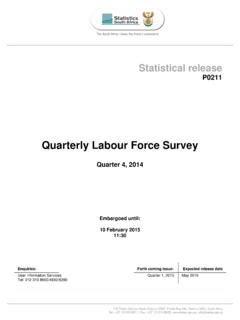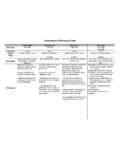Transcription of Core Values of Home and Community-Based Long …
1 Core Values of home and Community-Based long Term care Service Delivery Systems Principles and Guidelines for Service Delivery Concepts of Informed Choice and Informed Consent White Paper Ethic of care OKDHS ADvantage Administration Ethic of care Expected Outcome: Using the principles of Autonomy, Responsibility, and Accountability as a basis, these practice guidelines for service delivery Ethic of care clarify fundamental Values and promote improved practice of all health care 1 Principles and Guidelines for Informed Choice and Consent: For all Health care Providers and Planners New Zealand Department of Health, May 1991. Informed Choice and Informed Consent1 DEFINITIONS ..1 Ethic of care 1 Informed Choice 1 Informed Consent 1 Purpose of Informed Choice/Consent Guidelines 3 Informed Choice and Consent Service Delivery Expectations 3 Benefits of Understanding and Application of Consumer Informed Choice/Consent 3 Informed Choice and Consent Infrastructure: 4 Criteria for Development of Guidelines 4 PRINCIPLE ONE autonomy.
2 5 Guidelines for Respecting Autonomy in the Informed Choice and Informed Consent Process 5 PRINCIPLE TWO responsibility ..9 Guidelines for Principle 2 9 PRINCIPLE THREE accountability ..10 Guidelines for Principle 3 10 Glossary of Legal Terms ..12 CONTENTS Ethic of care : Informed Choice and Informed Consent 1 Ethic of Care2 Ethic of care based Service Delivery is: The right service (appropriate, least intrusive intervention); In the right amount (to meet the Consumer s need); Delivered by the right Provider (qualified and competent); To the right person (a Consumer that needs service); In the right setting (least restrictive, most integrated setting as appropriate to the person s needs); At the right time (a balance between Consumer preference and Provider ability); For the right price (a balance between Provider prosperity and payer affordability); To achieve a right outcome (Consumer directed/Provider supported).
3 Informed Choice Informed Choice involves the exchange and understanding of relevant information so that a knowledgeable, reasoned and un-pressured decision can be made by the health care Consumer, or the Consumer s delegated representative, who has the competence and legal capacity to make such choices: Informed Choice is a pre-condition of Informed Consent Informed Choice emphasizes the autonomy of the individual, and involves respect for the rights of individuals to make decisions about actions that affect them. Consumer Informed Choice is a pre-condition for establishing what care is reasonable and right to deliver to the Consumer. Informed Consent Informed Consent is a voluntary and un-pressured agreement by a Consumer to accept a service, treatment, or intervention about which the Consumer is knowledgeable with regard to purpose, expected outcome, mode of delivery, health and safety risk and alternative options.
4 2 Ethic of care Concepts of Reasonable care and Legal Risk, OK DHS ADvantage Administration, March 2002. DEFINITIONS Ethic of care : Informed Choice and Informed Consent 2 Informed Consent documents the Consumer s Choice to accept, or not accept as the case may be, a treatment, service or intervention and documents that the Consumer s autonomy including the right to make this decision has been honored. Consumer Informed Consent is a pre-condition for establishing that care is reasonable and right to deliver to the Consumer. Ethic of care : Informed Choice and Informed Consent 3 Purpose of Informed Choice/Consent Guidelines Help Providers achieve high-quality and appropriate "Consumer centered" health care , of which informed choice and informed consent are essential aspects; Provide guidance for the development, practice, and assessment of informed choice and informed consent policy and practice within all health care services; Identify the ethical requirements involved in informed choice and informed consent and who is responsible for carrying them out.
5 Informed Choice and Consent Service Delivery Expectations Health care Providers have the desire to assure Consumer Informed Choice and Consent and have the relevant knowledge, skills, and competence to adequately explain options and implications of each to their health service customers; Health care Providers and funders respect the rights of Consumers; Providers and funders proactively educate Consumer/family on consumer s rights and responsibility to be an informed and active participant in care decisions; Consumers, or their representatives, have the desire to actively and responsibly participate in decisions affecting their health care services; Delivery system Funders and their administrative agents commit adequate resources to reimburse Providers and to provide oversight to support Consumer Informed Choice and Informed Consent service delivery; If any of the above, A through D, Informed Choice and Consent Service Delivery expectations is not met, all parties commit resources to correct.
6 Benefits of Understanding and Application of Consumer Informed Choice/Consent Increases the individual s control over their own life, and increases their autonomy and integrity; Promotes trust and partnership between the health care Consumer and the health care Provider; Encourages individuals to accept responsibility for their health. Minimizes inappropriate care and adverse risk to all parties; OVERVIEW Ethic of care : Informed Choice and Informed Consent 4 Promotes respectful appreciation of each partner s role and responsibility to achieve appropriate, quality Informed Choice and Consent Infrastructure: Curriculum and training that incorporates concepts and principles of Consumer Autonomy, Responsibility, and Accountability into all long term care service delivery levels: Funder, Provider, and Consumer/family; Provider requirement to educate staff to respect Consumer Autonomy, Responsibility, and Accountability and to follow procedures to appropriately present each Consumer with choices and obtain Consumer Informed Consent for each service.
7 Quality Assurance/Quality Improvement (QA/QI) systems at Funder and Provider levels based on Ethic of care principle of informed choice of service as defined by individual care plans appropriately developed and implemented using reasonable care procedures to achieve Consumer directed/Provider supported outcomes; Informed Choice and Informed Consent are parts of a process that is integral to quality health care service delivery; Informed Choice and Informed Consent are NOT to be compartmentalized as isolated events, separate and apart from health service delivery. ethics committees intrinsic to Funder and Provider QA/QI systems that are charged with the responsibility and empowerment with the authority to: Systematically review situations in which disagreement exists on Ethic of care principles being followed and to evaluate failures to provide the informed choice/informed consent service delivery; Discover reasons for failure; and Make recommendation for policy, procedure and/or personnel changes to prevent future failures.
8 Criteria for Development of Guidelines Are defined, relevant and attainable; Are subject to continuing evaluation and revision; Respect the individual, including their race, culture, religion, gender, sexual orientation, level of ability and age, regardless of ability to pay or pay source for health care ; Facilitate partnership between health service Providers/planners and health service Consumers; Comply with the Federal and State laws and regulations. Ethic of care : Informed Choice and Informed Consent 5 Autonomy means self-determination. In any individual case, autonomy may be influenced by the cultural Values and beliefs of the individual. The principle of autonomy requires that the right of each person to individual beliefs, desires, Values , and goals be respected and safeguarded. Health care involves an agreed transaction between Providers and Consumers of services.
9 Since the relationship behind the transaction is often an unequal one, special care is required to ensure respect for the autonomy of Consumers. Respect for autonomy involves seven key points: 1. effective communication 2. adequate information 3. comprehension 4. competence 5. absence of coercion 6. the right to refuse proposed assistance, equipment, or treatments and/or procedures 7. advocacy. The following guidelines for autonomy are given in the context of each of these key points. Guidelines for Respecting Autonomy in the Informed Choice and Informed Consent Process Communication Effective communication is the key to enhancing autonomy. In general, communication is necessary before any proposed assistance, equipment, or treatment, procedure, examination, teaching, or research commences. In ADvantage and State Plan Personal care Programs, the Uniform Comprehensive Assessment Tool (UCAT) and the Nurse Evaluation provide Consumer health and safety assessment information.
10 The provider gives the consumer communication supports and information needed to facilitate communication and enable the consumer to make informed decisions. In exceptional circumstances, the condition of the Consumer may make communication impossible and there may be no-one authorized or available to consent on the Consumer's behalf. In emergencies, for instance, the primary need is to treat the Consumer. Where the ability to consent is absent or impaired, treatment should be no more than that needed to treat the immediate problems or crisis. Once the emergency is over, the Consumer must be given information about the treatment they received. Providers and/or administrative representatives communicate directly with the consumer unless a legal document or agreement delegates authority to another person to speak and decide on behalf of the consumer: PRINCIPLE ONE autonomy Ethic of care : Informed Choice and Informed Consent 6 Legal documents or agreements that delegate this authority are durable power of attorney or power of attorney , or a court may delegate this authority to a curator or guardian.


